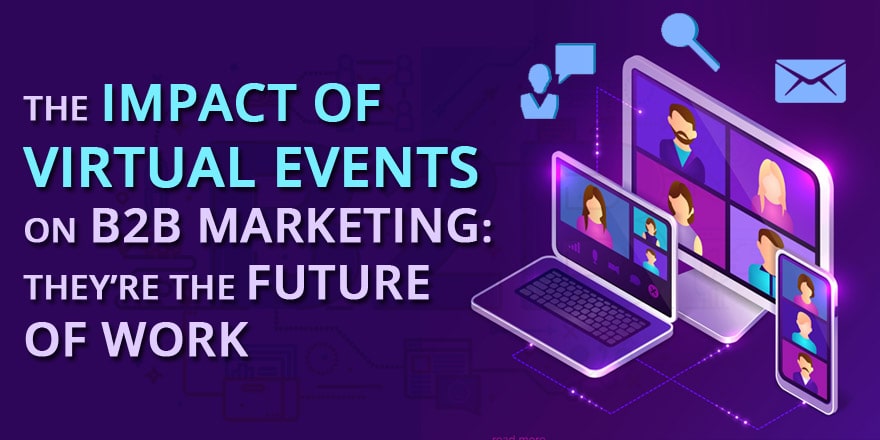
In recent times, there has been a rush of global concerns about the novel COVID-19 outbreak that has compelled many organizations to either cancel or postpone their physical meetings. While many shut down the opportunities, some tried to dig for solutions. Yes, organizing virtual events is one of the top things in the mind of B2B marketers these days.
Since there are new challenges every day for companies, this time is also offering valuable opportunities like how to create an impactful virtual event or how to regain the lost spark of a B2B enterprise. Virtual events are the future of B2B marketing, as they are beneficial and convenient all at the same time.
As per Bizzabo, about 80 percent of B2B marketers believe that live events are vital for their campaign’s success. Post survey, B2B marketers rated virtual events as the most-effective marketing mode over digital advertising, email marketing, and content marketing. Apparently, 24 percent of B2B marketing budgets are dedicated to this marketing mode and there is a lot of change in B2B buyer behaviour in this pandemic period. Considering the effect these events have on B2B marketers’ results, and the COVID-19 plight reminds us of how essential it is to be consistently innovative in our efforts to anticipate how global changes will evolve and how to work them out.
Virtual events were started as a trend in the early 2000s with corporate giants like IBM and Microsoft pioneering the unique, tech-savvy phenomenon that everyone couldn’t stop following. Despite being the initiators of technology, these leaders, along with all their followers, delivered digital events with interfaces, and substandard user experience. Many challenges were faced like screens would get stuck or blurry, web pages would take longer to load, event navigation seemed disjointed, and the whole experience was disturbing and far from being a seamless experience. As per Bizzabo, 2020, about 93 percent of event marketers are planning to invest in virtual events.
Many B2B marketing agencies support events on virtual platforms for the biggest tech companies in the world. We realize the importance of running an effective event marketing strategy. As an integral part of your marketing strategy, events can build or destroy your brand reputation at large. It can also help deepen your bond with existing customers and prospects at any stage of their purchasing funnel. Therefore, it is essential to keep them at the surface of your priority list.
However, much before the COVID-19 crisis began, hosting in-person events had already begun to fade off. In-person events are expensive and time-taking to organize as well as to attend. Attendees face downtime and lose productivity. According to reports, about 48 percent of marketers are investing at least 21 percent of their marketing budget in live events.
Many employers have subsidized their travel, dining, and hotel costs. As more businesses strive to go economical and promote more budget-friendly policies, attendance at these events may decline to participate.
These are good enough reasons to host virtual events. Soon after the global crisis passes of COVID-19, we expect a strong belief in the culture of virtual events more for B2B marketing campaigns. By developing a seamless virtual event strategy, you can also take forward the trend of working in a productive, time-saving, and much budget-friendly manner than ever.
For example, many companies who provide B2B strategy building services, hire employees who work from home offices around the world. It has made it a priority to lead the future of work initiative for distributed workforces. To live their objectives, these marketing teams hold highly engaging virtual team-building events, including virtual parties. The event preparation is of almost the same kind. It relies on event managing staff, attendees, and other services to send party favors ahead of time to ensure everyone enjoys the same access and the same perks.
While these events are not in the same form as a multiple-day industry physical conference, keeping the spirit of the future work—long-term and wide-approaching benefits as work practices evolve. It is in the mind of employees as they consider the comprehensive approach to a virtual event strategy.
Below are the ways which will help you achieve your goals in a competitive business environment through virtual events:
We has attempted to design a 6-step checklist to ensure that your virtual events strategy is set with the right content and technology. Also that it aligns with your overall marketing strategy. Let us discuss these steps in detail below.
Post COVID-19 crisis, there will be an option for big companies and smaller ones, to either host in-person meetings or continue to host virtual events for B2B marketing campaigns. While some companies will be accustomed to the former mode of hosting events, others will choose to eliminate the old method and embrace the latest virtual conferencing and online presence advancements. Let’s see some virtual benefits events bring along for B2B marketers.
With the help of thoughtful planning and a well-organized strategy, B2B companies have the potential to engage the participants through virtual events and make it successful. Through virtual events, prospects can find opportunities where they can grasp, network, and even purchase the product or services offered. The quick demonstration of the product or real-time product launch can speak publicity from its mouth. Virtual events reduce costs, broaden your reach, and shape the future of your business. It will also help you derive a better ROI.
Enterprises today navigate a complex business landscape combined with rapid technological evolution and fierce competition.…
In the ever-evolving B2B ecosystem, staying ahead of the curve is becoming a matter of…
From time immemorial, lawyers have played a crucial role in shaping our social fabric. With…
A pioneer in the automotive industry, the USA was the first country in the world…
The global software spectrum is so diverse and versatile that there is never any dearth…
What is the first thing that crosses your mind while visualizing a healthcare facility? The…